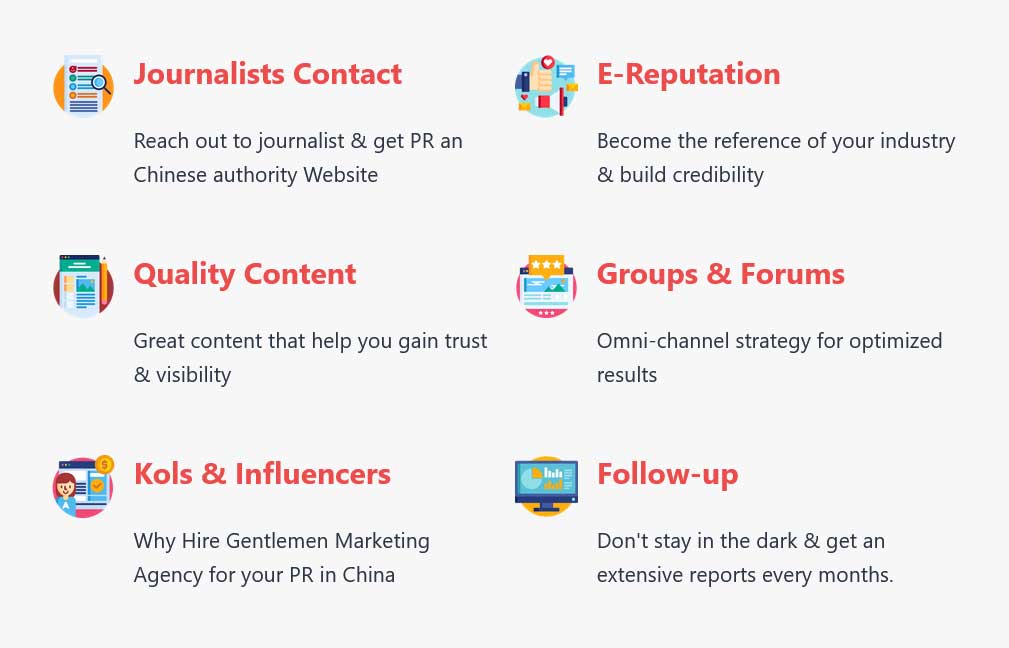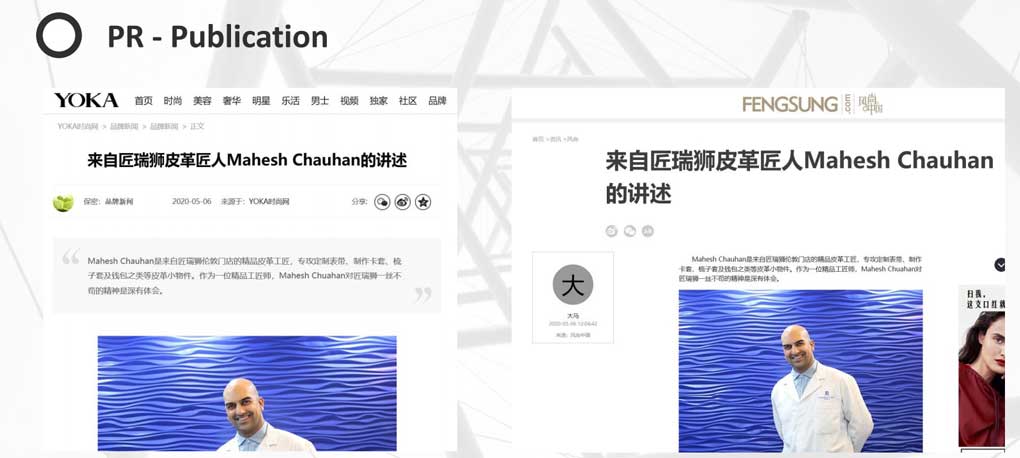Public Relations in China: Choosing a Top Agency

If you’re doing business in China, or with Chinese companies, then you need to know about public relations in China. The PR landscape is different here, and if you want to be successful you need to understand the cultural context and how things work. This article will give you a brief introduction to public relations in China so that you can start off on the right foot.
Public Relations in China: The Basics
There is without a doubt a common confusion between marketing and public relation. Considering they both focus on influencing Chinese People thinking and behavior, it is somewhat understandable. However, while marketing focuses more on consumer behavior, public relations (PR) focus more on consumer perceptions. Although in many cases these goals may overlap, each goal is different. Ensuring that these two departments are on the same page is crucial to effectively managing public relations in China.
Cost-Effective Agency
KPI and Results focused. We are the most visible Marketing Agency for China. Not because of huge spending but because of our SMART Strategies. Let us help you with: E-Commerce, Search Engine Optimization, Advertising, Weibo, WeChat, WeChat Store & PR.
While many companies adjust their public relations strategy to the nuances of the Chinese market, a lot simply don’t. The reality is, when engaging in China’s public relations activities, one must take into account the government’s role in the media. Almost all forms of media have some sort of relationship with government agencies.

When it comes to China, you must consider the agenda of their government. In most cases, companies should think of media outlets as dealing directly with this country’s leaders and taking care not t interfere with any interests they may have identified ahead of time
Do you need the Top Public Relation Agency in China: Influencers, KOL, Chinese stars
Contact us today for any Quotation.
The importance of public relations in China can’t be overstated. This is a necessary tool that helps companies market their products and services while simultaneously making consumers aware, which ultimately fuels these purchases with ease!
In addition, public relation also involves developing reputation – which can range from good customer service skills or avoidance when dealing with crisis situations- but one thing remains integral: quality content creation so as not only to maintain your current brand image but create an updated new one too
ePR do you need Support?
We said it, networks such as Xinhua News Agency and People’s Daily are still under tight control, while other networks are more focused on profits than on the political agenda. Understanding these external influences can determine the success or failure of your China PR strategy. Working with a PR agency specialized in the market will come in handy.

Setting up a public relations strategy for China
China counts more than
- 2,200 emagazines,
- over 9,000 Enews ,
- over 2,000 online radio stations
- over 3,000 eTV in China.
China is one of the few countries where the print media has not slumped sharply. However, online newspapers have begun to erode their print media customer base, resulting in a decline in print media but still declining significantly.
The largest of these online newspapers are Sina, Sohu, 163, QQ News, People’s Daily, Xinhua News Agency, Fenghuang Wang, and so on. Internet media platform to make China’s media more dispersed. This makes it somewhat difficult to distribute the right channels in emerging markets and at the same time provides an opportunity for China’s PR strategy.
The average cost of PR Campaigns in China
In order to gain popularity in China, you will need a large amount of money. Unlike the United States where PR costs $3-5k monthly and campaign strategies can be as low as around 10k/1M+ per month depending on what type it is (advertisements vs social media).
What do you need to keep in mind for a successful PR Strategy in China?
Localization: Geolocalized your PR campaign
Localization is the most important aspect of developing your PR strategy in China. Companies targeting the greater China region, they must recognize the differences in languages between Taiwan, China, and Hong Kong before they can achieve the greatest results.
The message must fit every market and work hard to resonate with the local population. Due to the vast differences in values and consumer behavior, effective communication in the West may not be effective in China. The message must also be consistent with the Chinese government’s ideals and aspirations since many media outlets are largely directly controlled by the state.
Having a home-grown content writer for your PR work will greatly enhance your chances of influencing the media’s success with your brand. These authors should understand China’s big narratives and understand what types of content resonate with their target audience.
Topics that should be avoided at all costs:
The Chinese government heavily monitors and controls the media. For this reason, you must exercise caution when it comes to what information is included in your PR campaigns.

Terms that are too sensitive for public discussion or invocation by the Chinese government can’t be mentioned. Avoid any sensitive topic such as Taiwan/ Xinjiang/ Tibet. Sex is also heavily controlled on the Chinese internet. Watch out for any topics that could be controversial and become too big for comfort especially on social media like Weibo, this could backfire.
Chinese Media preferences
Although the media must be consistent with the overall official state, they also look for stories that ultimately drive sales. Traditional media tend to look for novelty/human interest stories that can effectively drive sales. Because of their high degree of sharing, these online are also valid. Including these elements in narratives usually leads to greater success.
Written Content
Chinese media are also more inclined to write the content in a ready format. As content has grown, Chinese reporters have been trying to keep up with the needs of their readers.
Preparing articles, press releases, and other forms of content can lead to strong relationships with media organizations. This also allows for greater control of the final product, as usual, the agent will distribute the content with very little editing.

However, this can be a double-edged sword, just like You will lose the benefits of a professional editor improving your content. A press conference like this often works well. Social media as part of your Chinese public relations strategy Although social media is traditionally considered a marketing-led channel, it should also play a role as a PR professional Social media channels have become Businesses that seek effective ways to communicate information and improve consumer reputations.
Chinese Social Media
China’s population is generally more active on social media than the West. Although large social media channels like WeChat and Weibo are effective for public relations, smaller forums tend to be more efficient, especially for small brands.
Big brands should focus their budgets on larger channels to ensure content reaches their target audience. While smaller brands also have access to these channels, they will not be able to reach large numbers of users without a significant amount of advertising and advertising.

Due to the sharing capabilities embedded in these platforms, distributing content on social media can be effective, allowing for the organic distribution of content. Social media also allows users to participate, which may be the most effective form of PR. Direct interaction with users is very beneficial for reputation and trust-building, so social media will almost certainly become part of China’s PR strategy. Social Media Applications are important for Marketing and Public Relations in China if you want to learn more about social media platforms in China, please read the following links:
Press Conferences
Press conferences are popular in China, and it is often the case that journalists participate extensively. According to Maria Dantz, blogger at Edelman, a world-renowned public relations agency, such activities are expected to be used to provide company news, product announcements, research reports or thought leadership activities. Her blog can be seen here.
Want to improve your public relations strategy in China?

Drop us a request here and let’s schedule a call to discuss your goals in the country with one of our experts







online PR is very good for brands, like using KOL and model to promote brands.
The job of model in China has changed to influencers.